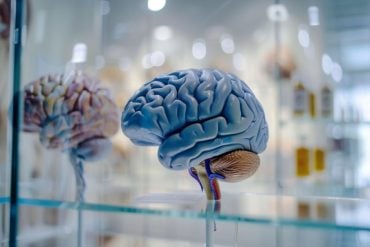Summary: FKBP51, a protein linked to depression and anxiety disorders, also acts as a link between the stress response system and metabolic processes.
Source: Max Planck Society
For the first time, the Max Planck Institute of Psychiatry and the University Hospital Bonn have been able to directly link a stress factor in the brain to the cell’s recycling system and obesity. This could enable a completely new approach to treat stress-induced metabolic diseases.
Researchers have long known that the protein FKBP51 is associated with depression and anxiety disorders. FKBP51 is involved in the regulation of the stress response system—if this is disturbed, mental illnesses can develop.
The researchers at the Max Planck Institute (MPI) of Psychiatry and the University Hospital Bonn (UKB) have now discovered a surprising new role for this protein: it acts as a molecular link between the stress response system and metabolic processes in the body. The central mechanism is autophagy, the cellular waste recycling process.
“Autophagy is the cell’s recycling program, which gets rid of old or damaged proteins. As such, it can counteract aging processes and—as we have now been able to show—reduce obesity,” explains Nils Gassen, Head of the Neurohomeostasis Research Group at the UKB, one of the project leaders.

Mathias Schmidt, Research Group Leader at the MPI of Psychiatry, adds: “The fact that the stress factor FKBP51 in the brain is a master regulator of autophagy and thus obesity reveals a number of new intervention possibilities, from pharmacological manipulation of FKBP51 to autophagy-inducing fasting diets or sports programs.”
Stress resilience for everyone
The possibilities opened up by the new findings are very diverse. Especially now, with the ongoing worldwide pandemic, it becomes clear how uncontrollable stress can affect our psyche and our body. Processes such as autophagy can be positively influenced by an active lifestyle and a healthy diet.
Gassen and Schmidt are therefore planning further collaborations intended to provide concrete data on how each individual can increase their autophagy and thus their individual stress resilience.
About this stress and obesity research news
Author: Press Office
Source: Max Planck Society
Contact: Press Office – Max Planck Society
Image: The image is in the public domain
Original Research: Open access.
“Mediobasal hypothalamic FKBP51 acts as a molecular switch linking autophagy to whole-body metabolism” by Alexander S. Häusl et al. Science Advances
Abstract
Mediobasal hypothalamic FKBP51 acts as a molecular switch linking autophagy to whole-body metabolism
The mediobasal hypothalamus (MBH) is the central region in the physiological response to metabolic stress. The FK506-binding protein 51 (FKBP51) is a major modulator of the stress response and has recently emerged as a scaffolder regulating metabolic and autophagy pathways.
However, the detailed protein-protein interactions linking FKBP51 to autophagy upon metabolic challenges remain elusive. We performed mass spectrometry–based metabolomics of FKBP51 knockout (KO) cells revealing an increased amino acid and polyamine metabolism.
We identified FKBP51 as a central nexus for the recruitment of the LKB1/AMPK complex to WIPI4 and TSC2 to WIPI3, thereby regulating the balance between autophagy and mTOR signaling in response to metabolic challenges. Furthermore, we demonstrated that MBH FKBP51 deletion strongly induces obesity, while its overexpression protects against high-fat diet (HFD)–induced obesity.
Our study provides an important novel regulatory function of MBH FKBP51 within the stress-adapted autophagy response to metabolic challenges.







